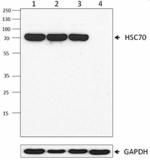- Clone
- 9/2 (See other available formats)
- Regulatory Status
- RUO
- Other Names
- Heat Shock 70 kD Protein 8, HSP70, HSP73, HSPA10, Heat Shock Cognate Protein 54, HSC54, heat stress cognate 70
- Isotype
- Mouse IgG2b, κ
- Ave. Rating
- Submit a Review
- Product Citations
- publications

-

Total lysates (15 µg protein) from 293T and 293T/HSC70 CRISPR/Cas9 knockdown (KD) cells were resolved by electrophoresis (4-20% Tris-Glycine gel), transferred to nitrocellulose, and probed with 1:500 diluted (1 µg/mL) purified anti-HSC70 (HSPA8) antibody, clone 9/2 (upper) or 1:3000 diluted anti-GAPDH (poly6314, Cat. No. 631401) antibody (lower). Proteins were visualized by chemiluminescence detection using a 1:3000 diluted goat anti-mouse-IgG secondary antibody conjugated to HRP (Cat. No. 405306) for anti-HSC70 (HSPA8) antibody, and a donkey anti-rabbit IgG Antibody conjugated to HRP (Cat. No. 406401) for GAPDH. Lane M: MW ladder. -
Western blot analysis of cell lysates from HeLa (lane 1), THP-1 (lane 2), HEK293 (lane 3), and Raw264.7 (lane 4). Anti-HSC70 antibody (clone 9/2) was used and followed by HRP anti-mouse IgG antibody. GAPDH antibody (clone poly6314) was used as a loading control.
| Cat # | Size | Price | Quantity Check Availability | Save | ||
|---|---|---|---|---|---|---|
| 682102 | 100 µg | 212€ | ||||
Heat shock cognate 71 kD protein or HSC70 (HSPA8) is one of the major constitutively expressed, cognate protein chaperones to supply a multitude of the housekeeping chaperoning functions. As a chaperone, HSC70 binds to nascent polypeptides to facilitate correct folding. Besides the chaperone functions, secreted HSC70 is involved in inflammatory signal pathways via extracellular interaction with TLR2/TLR4. It also plays a central role in modulating antigen transport within cells to control MHC class II presentation during nutrient stress. Furthermore, HSC70 may serve as a molecular switch to modulate endocytic and autophagy pathways.
Product DetailsProduct Details
- Verified Reactivity
- Human
- Antibody Type
- Monoclonal
- Host Species
- Mouse
- Immunogen
- Purified recombinant human HSC70 fragment (1-1755bp of Acc. Y00371)
- Formulation
- Phosphate-buffered solution, pH 7.2, containing 0.09% sodium azide.
- Preparation
- The antibody was purified by affinity chromatography.
- Concentration
- 0.5 mg/ml
- Storage & Handling
- The antibody solution should be stored undiluted between 2°C and 8°C.
- Application
-
WB - Quality tested
KO/KD-WB - Verified - Recommended Usage
-
Each lot of this antibody is quality control tested by Western blotting. For Western blotting, the suggested use of this reagent is 0.5 - 2.0 µg per ml. It is recommended that the reagent be titrated for optimal performance for each application.
- RRID
-
AB_2566574 (BioLegend Cat. No. 682102)
Antigen Details
- Structure
- 646 amino acids with a predicted molecular weight of approximately 71 kD.
- Distribution
-
Cytoplasm, nucleus, and cell membrane.
- Function
- Chaperone and antigen transport.
- Interaction
- PACRG, HSPH1/HSP105, IRAK1BP1, BAG1, DNAJC7, DNAJB14, E3 ligase CHIP, CITED1 , CDC5L, PLRG1 and BCAS2, SV40 VP1, TRIM5, METTL21A, PARK2, and FOXP3.
- Biology Area
- Cell Biology, Cell Cycle/DNA Replication, Chromatin Remodeling/Epigenetics, Immunology, Innate Immunity, Neurodegeneration, Neuroinflammation, Neuroscience, Protein Trafficking and Clearance, Signal Transduction, Transcription Factors
- Molecular Family
- Heat Shock Proteins, Protein Kinases/Phosphatase
- Antigen References
-
1. Deffit SN, Blum JS. 2015. Mol. Immunol. 68:85-8.
2. Pratt WB, et al. 2015. Annu. Rev. Pharmacol. Toxicol. 55:353.
3. Stricher F, et al. 2013. Autophagy 9:1937.
4. Liao Y, et al. 2014. Curr. Pharm. Des. 20:101.
5. Höhfeld J. 1998. Biol. Chem. 379:269. - Gene ID
- 3312 View all products for this Gene ID
- UniProt
- View information about HSC70 on UniProt.org
Related Pages & Pathways
Pages
Related FAQs
Other Formats
View All HSC70 (HSPA8) Reagents Request Custom Conjugation| Description | Clone | Applications |
|---|---|---|
| Purified anti-HSC70 (HSPA8) | 9/2 | WB |
Compare Data Across All Formats
This data display is provided for general comparisons between formats.
Your actual data may vary due to variations in samples, target cells, instruments and their settings, staining conditions, and other factors.
If you need assistance with selecting the best format contact our expert technical support team.
 Login / Register
Login / Register 










Follow Us